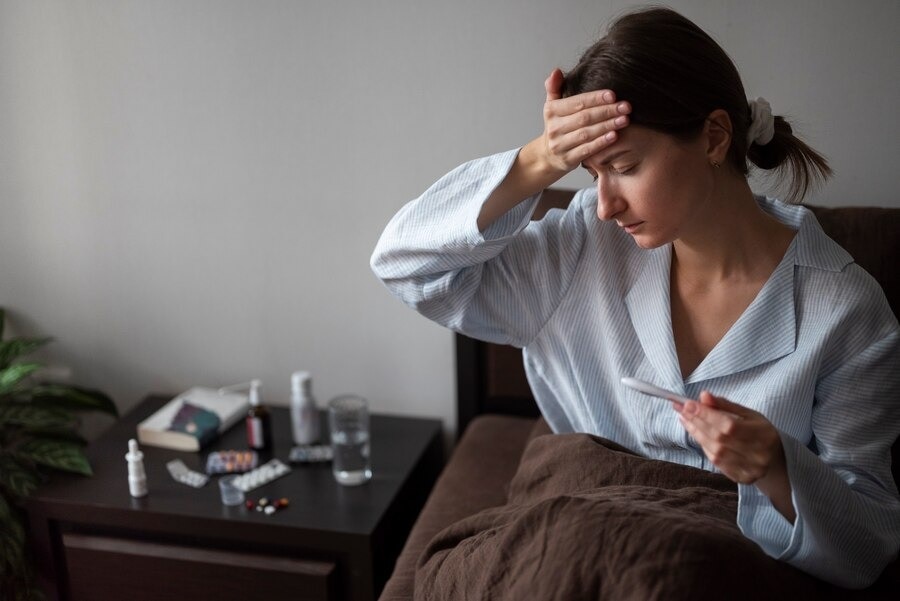Here is a complete guide on the signs, symptoms and essential treatments of monsoon fever and dengue. Read on!
With the arrival of the monsoon season, the risk of contracting various diseases including monsoon fever and dengue increases significantly. It is essential to understand the difference between these two conditions to ensure timely and appropriate treatment. Here is a complete guide to the essential signs and symptoms of monsoon fever and dengue.
Monsoon fever
Monsoon fever is a type of fever caused by pathogens such as bacteria and viruses. The sudden change in weather from scorching heat to cooler temperatures can take a toll on your overall health. Monsoon brings the risk of developing health problems such as indigestion, fever, skin rashes, eczema flare-ups, loose stools, vomiting, and body ache. Factors such as infections, allergies, poor sanitation, and weather changes can cause monsoon fever. The risk of developing infections such as viral infections, bacterial infections, and mosquito-borne diseases increases during the monsoon season. Health problems such as flu and the common cold can be easily transmitted due to cold weather and overcrowded places. Cold and humid weather creates a perfect atmosphere for bacteria to breed, leading to typhoid fever and leptospirosis. One may experience symptoms such as fever with persistent high temperature, chills, feeling of extreme tiredness, constant headache, sore throat, vomiting, nausea, diarrhea, runny nose, and extreme body pain, especially in muscles and joints.
The symptoms of monsoon fever persist for a few days and start improving with proper medication and necessary precautions, leading to quick recovery. In some cases, the symptoms may worsen, indicating the need for a quick diagnosis. To prevent the risk of contracting monsoon fever or viral fever, one should avoid consuming cold drinks or foods like soft drinks, popsicles, cold water, and iced coffee as they can increase the chances of having a fever and sore throat. Dressing appropriately with thick layers of clothing during colder temperatures can help maintain body temperature during monsoon. Eating complete meals that contain essential nutrients like minerals, vitamins, proteins, healthy fats, and carbohydrates can potentially strengthen your immune system, thereby reducing the risk of falling ill. Consult your doctor for a personalized treatment to effectively combat monsoon fever.
Dengue
Dengue fever is a waterborne disease caused by infected mosquitoes called Aedes aegypti. Dengue fever is a type of viral infection that can be easily spread from person to person. One may experience symptoms such as sudden fever ranging from 104°F to 40°C, skin rashes, severe pain behind the eyes, nose bleeds, bleeding gums, nausea, stomach pain, and muscle and joint pain. The intensity of the fever can range from mild to severe. It usually lasts up to a week and starts to improve after taking certain medications. It may take one a week or more to recover from dengue fever accompanied by fatigue.
In some cases, your doctor might suggest you to get hospitalized for timely intervention. There are no specific antivirals or medications to cure the onset of dengue fever. Getting enough rest can help relax the body and improve your overall condition. Being dehydrated can only worsen the symptoms and lead to a rise in fever. Make sure you are hydrated by drinking plenty of fluids and ORS can help keep dehydration in the body. Mosquito repellent works wonders in protecting you from infected mosquito bites. Apply a generous layer of mosquito repellent on your clothes before going outdoors for better protection. Neglecting the symptoms can only worsen your condition and cause more pain and discomfort. Consult experts or doctors for a quick diagnosis to effectively combat dengue fever. If left untreated, it can lead to serious complications like dengue hemorrhagic fever or dengue shock syndrome.
(Contributions: Dr. Manjusha Agarwal, Senior Consultant, Internal Medicine, Gleneagles Hospitals Parel Mumbai)
